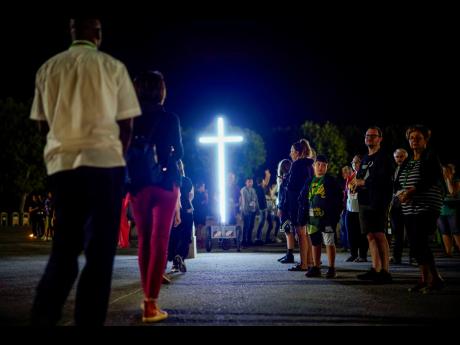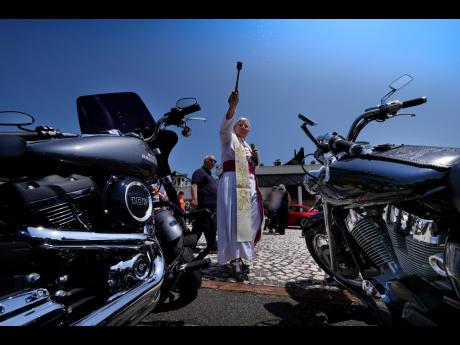Nearly 80 per cent of Italians say they are Catholic, but few regularly go to church
ISOLA DEL GRAN SASSO, Italy (AP):
Two children scribbled petitions to St Gabriele dell’Addolorata in the vast sanctuary where the young saint is venerated in this central Italian mountain village. Andrea, six, asked for blessings for his family and pets. Sofia, nine, gave thanks for winning a dance competition.
Their parents bring them here often, as their father’s own family did, and consider themselves better Catholics than many. The mother, Carmela Forino, even says a prayer for forgiveness when she hears someone utter a common blasphemy on the sanctuary esplanade.
But they rarely go to Mass and don’t receive Communion because they are not married, thus shunning two sacraments the Catholic Church considers foundational.
“I practise where I want. Every morning I pray on my own,” Forino said in the sanctuary room filled with votive offerings, from baby bibs to sports jerseys, left by two million annual visitors to San Gabriele. “One has to believe in something, right? You do what you feel in your heart. You can’t require me to go to Mass on Sundays.”
Elsewhere in deeply secular Western Europe, the ‘nones’ — those rejecting organised religion — are growing fast. In Italy, long considered the cradle of the Catholic faith, most people retain a nominal affiliation, steeped in tradition but with little adherence to doctrine or practice.
According to the latest Pew Research Center survey, 78% of Italians profess to be Catholic. But the Italian statistics agency, ISTAT, says only 19 per cent attend services at least weekly while 31 pwe cent never attend.
The COVID-19 pandemic accelerated a disengagement with the Catholic faith that started at least a generation ago, said Franco Garelli, a University of Turin sociology professor who’s been studying religiosity in Italy for decades.
“‘I don’t have time, I don’t feel like it’ — there isn’t a real reason. That’s what’s scary,” said the Rev Giovanni Mandozzi, parish priest in the sanctuary’s village, Isola. “I tell them, ‘I do Mass in under 40 minutes, you can leave your pasta sauce on the stove, and it won’t even stick to the bottom of the pot.’”
“The sign of the cross isn’t a quick fly-swatting gesture,” he later preached in Mass. Fewer than two dozen elderly parishioners gathered in a former butcher shop, because Isola’s church was damaged by two earthquakes that have devastated the region of Abruzzo since 2009.
At the same time, the bar next door hummed with young families.
“Everything has changed,” said bar owner Natascia Di Stefano, the mother of two teens. “Sunday used to be church with your family. Now youths don’t even want to hear about it, like an ancient thing that’s useless.”
Nearby, several close friends in their 20s enjoyed drinks outside another bar facing a medieval chapel.
They described growing up attending Mass and catechism, only to stop in their early teens after being confirmed. That’s when Catholics, usually baptised as infants, commit to witness their faith through the gifts of the Holy Spirit — but for many, it has instead become the last rite they feel obligated by family tradition to partake in.
“It would have become just a routine,” said Agostino Tatulli, 24, a college and music conservatory student. “I’d say I’m spiritual. I don’t know if God exists.”
From his childhood serving as an altar boy, he misses “the sense of community that formed on Sunday mornings, with the old lady you’d never see otherwise.” Tatulli still finds some of that in gigs with a marching band for the popular feasts of patron saints.
This summer, he participated in two such processions over 48 hours. One of them, in the hamlet of Forca di Valle on the ridge above Isola, was a much smaller affair than local retiree Domenico Verzilli remembered from his childhood. Back then, bells tolled at 5 a.m. to start the festivities, and the church — now closed from earthquake damage — was full of large families.
But celebrating saints is still important, said fellow band member Federico Ferri, 28, who works for a local manufacturer of devotional items.
“I’m a Catholic believer in the saints, not in the church,” he added before the celebrating priest — who also runs the sanctuary’s youth ministry — called out to Ferri and others to join him on a tractor ride.
Ferri rarely goes to Mass, but has been attending more often the San Gabriele sanctuary after two motorcycle accidents.
Hundreds of bikers go for an annual blessing, as do thousands of teens for the early spring “blessing of the pens” used to take final exams — a tradition that felt “more superstitious than religious” to former pilgrim Michela Vignola.
Raised in the nearby seaside village of Pineto, Vignola, 36, regularly attended church until her confirmation.
“It’s taken for granted that you’re a believer, but you don’t participate. It’s not like I believed that much anyway,” she said in her hairdressing salon, next to a restaurant called ‘The Lost Sheep’. “Now I don’t even think about it.”
She coifs a lot of bridal parties, most still headed to church. Catholic wedding ceremonies remain the choice of about 60 per cent of Italians marrying for the first time. The sacrament is just a bit less popular than church funerals, favoured by 70 per cent of Italians, according to Garelli’s research.


